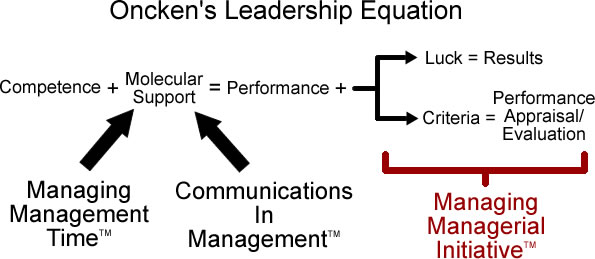Managing Managerial Initative™

How "Managing Managerial Initiative"™ supports the principles of "Managing Management Time"™
In Brief
In this program, attendees get down to the specific "areas of managerial/leadership concern" inherent in their jobs, insuring that MMT concepts and tools are applied so that:
- All aspects of the attendee's on-the-job activities are relevant,
- Performance in any relevant area of concern meets or exceeds an agreed upon standard, and
- The accountability and team structures of the enterprise are reinforced.
The Real World
Managers, at all levels, are accountable for both: (1) the performance of their operation and (2) for everything that happens in their jurisdictions whether they knew about it or not.
The above formula indicates that “performance plus luck equals results.” Oncken’s Fourth Law states that “To build a culture characterized by creativity, effective execution and high morale, its people must only be evaluated (and thus rewarded or reprimanded) for what they can control or influence, and NOT for the “luck element” in their jobs.”
People try to control performance and fairly evaluate their personnel in a variety of ways. “Before-The-Fact” (BTF) controls include management-by-objectives, goals, policies, systems, programs and job descriptions. BTF controls do not, in and of themselves, control anything because nothing has happened yet. “After-The-Fact” (ATF) controls include reviews, reports, audits, inspections and evaluations. They, too, control nothing because the events they reflect have already happened, the water is already “over the dam”, things are now beyond control.
The only effective control is “During-The-Fact,” (DTF) with each individual moment-to-moment as they are deciding in real time what to do and how to go about doing it.
Our Approach
MMI benefits you by giving you the tools for implementing DTF operating procedures and criteria for managing managerial performance. After mastering the techniques taught in this course, the managER-managEE team will be able to:
- develop standards that back up company goals,
- match people talents to specific jobs,
- break down jobs into measurable elements,
- guarantee action without an autocratic style of leadership,
- minimize, if not eliminate, those factors that produce uncertainty and procrastination in their jobs,
- reduce anxiety in the workplace, and
- establish measurable guidelines for activities that lead to the accomplishment of goals.
The most important tactical tool is the Performance Management Agreement (PMA), a key element in the performance management process in which the subordinate initiates an agreement for performance criteria and progress; it is the basis for organization-wide performance and productivity enhancement.
Thus chains-of-command are transformed into chains-of- agreement affecting the whole company without creating the bureaucratic apparatus required by most traditional performance evaluation systems imposed from the top and managed by staff functions.
MMI provides an ethical and workable mechanism— with manageable check points—for improving quality control, improving customer service a and a framework within which you can implement a multitude of other operational procedures throughout the organization.
PREREQUISITE:
Attending the MMT seminar is a prerequisite in order to insure that you are in the best position to make MMI work — to implement Oncken’s 2nd Law: “Before you can plan-your-work-and-work-your-plan, you must have control of both the timing and the content of what you do.”
Our Invitation To You
To make our Managing Managerial Initiative™ course available to your MMT graduates, contact us about conducting our course on-site at your company location.